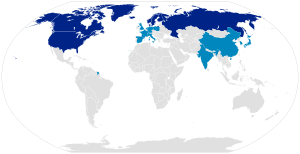
Back المجلس القطبي Arabic Conseyu Árticu AST Арктика кәңәшмәһе Bashkir Арктически съвет Bulgarian Consell Àrtic Catalan Arktická rada Czech Arktisk Råd Danish Arktischer Rat German Nordpolusa Konsilio Esperanto Consejo Ártico Spanish
| |
 | |
 members observers | |
| Formation | September 19, 1996 (Ottawa Declaration) |
|---|---|
| Type | Intergovernmental organization |
| Purpose | Forum for promoting cooperation, coordination, and interaction among the Arctic states, with the involvement of the Arctic Indigenous communities |
| Headquarters | Tromsø, Norway (since 2012) |
Membership | 8 member countries
13 observer countries
|
Main organ | Secretariat |
| Website | arctic-council.org |
| Part of a series on |
| Indigenous rights |
|---|
| Rights |
| Governmental organizations |
| United Nations initiatives |
| International Treaties |
| NGOs and political groups |
| Issues |
| Countries |
| Category |
The Arctic Council is a high-level intergovernmental forum that addresses issues faced by the Arctic governments and the indigenous people of the Arcticregion. At present, eight countries exercise sovereignty over the lands within the Arctic Circle, and these constitute the member states of the council: Canada; Denmark; Finland; Iceland; Norway; Russia; Sweden; and the United States. Other countries or national groups can be admitted as observer states, while organizations representing the concerns of indigenous peoples can be admitted as indigenous permanent participants.[1]